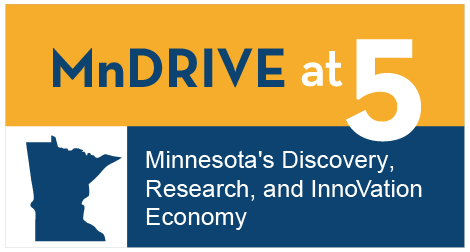
MnDRIVE—Minnesota’s Discovery, Research, and InnoVation Economy—is a partnership between the University of Minnesota and the State of Minnesota that aligns areas of research strength with the state’s key and emerging industries to address grand challenges. MnDRIVE receives $22 million annually from the state to support research in five strategic areas⸺Robotics, Global Food, Environment, Brain Conditions, and Cancer Clinical Trials.
UMN's Research Computing, which fosters and accelerates data-intensive research, receives partial funding from MnDRIVE and provides key support to these projects. Other areas that receive recurring funding from MnDRIVE include technology commercialization and research infrastructure.
MnDRIVE represents a unique, collaborative research model involving interdisciplinary research projects across the University that address grand challenges and include industry and community partnerships as a key component. Each of the research areas has committees and advisory boards to provide guidance on research objectives. The Research and Innovation Office (RIO) provides administrative support and tracks metrics for MnDRIVE.
MnDRIVE Areas

Robotics
Robotics, autonomous systems, and modern manufacturing systems are fundamentally structured on the integration of sensing, feedback and controls, and actuation. The MnDRIVE initiative on robotics, sensors, and advanced manufacturing has helped the University of Minnesota to play a vital role in bolstering Minnesota’s positions of leadership in sensors, robotics and automation, and has contributed to a revival of domestic manufacturing, particularly additive manufacturing.

Global Food
The world’s population is expected to grow to more than 9 billion people during the next 40 years, requiring a 70 percent increase in food supply. Despite today’s abundance, a multitude of issues persist. Global Food Ventures has three research focus areas to address these issues:
• Precision agriculture
• Informatics and crop/animal health
• Food safety innovations focused on multiple dimensions of food safety

Environment
MnDRIVE Environment is enhancing opportunities for Minnesota industries, including those in agriculture, aquaculture, and mining, through the use of science and technology to solve environmental challenges and efficiently use water and other precious resources. This initiative, which is part of a broad portfolio of water-related research at the University, supports and stimulates research and development on environmental remediation by using microorganisms, plants, enzymes, or chemicals, either by themselves or in combination, to remove pollutants from the environment. MnDRIVE Environment partners with state industries and government agencies to bring this research from the lab to field practice.

Brain Conditions
Brain conditions, including Parkinson’s disease, stroke, epilepsy and mental illness, are chronic afflictions that diminish a person’s quality of life. Through high-impact research and discovery in the field of neuromodulation, MnDRIVE trains the next generation of scientists and clinicians, and brings new and improved therapies to Minnesotans suffering from brain conditions and nervous systems disorders/deficits. The initiative is expanding University-industry partnerships to bring neuromodulation innovations to market to benefit patients and advance the state’s economy.

Cancer Clinical Trials
Nearly half of all Minnesotans will be diagnosed with a potentially life-threatening cancer during their lifetimes; one out of four Minnesotans die of cancer, and cancer is the leading cause of death in our state. To impact these grim statistics, local healthcare providers need equitable knowledge of novel cancer research as well as access to all options for patient care. The Minnesota Cancer Clinical Trials Network (MNCCTN) is a multi-site cancer clinical trials network across the state. Led by the Masonic Cancer Center, University of Minnesota, the MNCCTN is made up of several partner organizations that aim to improve cancer outcomes for all Minnesotans through greater access to cancer clinical trials in prevention and treatment.
MnDRIVE at 5

Since its inception, MnDRIVE research across the five research areas has involved more than 1,200 researchers in more than 150 departments and dozens of colleges across three campuses (Twin Cities, Duluth, and Morris). Learn more about how MnDRIVE's first five years helped to attract faculty who are leaders in their fields, hire research staff, renovate lab spaces, purchase equipment, and conduct world-class research with direct relevance to the residents and industries of Minnesota.